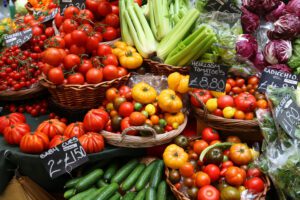UK food price inflation accelerated in June as soaring temperatures and extreme weather hit fruit and vegetable harvests, pushing up prices at supermarket tills.
New figures from the British Retail Consortium (BRC) show annual food price inflation climbed to 3.7% in June, up from 2.8% in May. This marks the first overall rise in shop price inflation in nearly a year, as consumers continue to feel the squeeze from climate-related crop disruptions and wider cost pressures.
Retailers have directly linked the increase to hot, dry weather reducing crop yields, in a sign that the climate crisis is beginning to exert a more visible and lasting impact on UK food prices.
Helen Dickinson, chief executive of the BRC, said: “We predicted a significant rise in food inflation by the end of this year, and this has been accelerated by geopolitical tensions and the impacts of climate change. Retailers have warned of higher prices for consumers since last year’s autumn budget and the huge rises to employer national insurance costs and the national living wage.”
The steepest increases in wholesale prices were seen in seasonal fruits, with gooseberries up 243% annually, blackberries up 25%, raspberries up 15%, and apples and strawberries up 7% and 3% respectively.
Volatile and extreme weather patterns are becoming increasingly costly for UK farmers. In addition to the effects of drought and high heat, wet weather during key planting seasons caused almost £1.2 billion in crop losses last year, according to industry estimates.
The impact of climate breakdown is now being felt globally, with poor harvests and geopolitical conflicts affecting supply chains and commodity prices. Earlier this year, high global temperatures led to a spike in chocolate prices as cacao crops in West Africa suffered, while coffee prices surged due to adverse weather in Brazil and Vietnam.
In the UK, the latest rise in food prices comes on top of significant business cost pressures. Retailers have repeatedly warned that recent fiscal policy decisions are forcing their hand on pricing. Chancellor Rachel Reeves’ autumn budget introduced a £25 billion increase in employer national insurance contributions and a 6.7% rise in the national living wage from April.
Mike Watkins, head of retailer and business insight at NielsenIQ, which helps compile the BRC’s monthly figures, noted that weather and wider supply chain changes were contributing to inflation. “While the current spell of good weather is helping to boost demand at many retailers, rising prices could become a concern if consumer willingness to spend declines later in the year,” he said. “Which means we can expect retailers to reinforce their value-for-money messages over the summer.”
Total shop price inflation, which includes non-food items, rose to 0.4% in June, up from a slight deflation of -0.1% in May. Analysts expect retailers to continue balancing price pressures with consumer demand, particularly as economic uncertainty and environmental volatility persist.
Read more:
UK food prices rise as hot weather slashes harvest yields, say retailers









